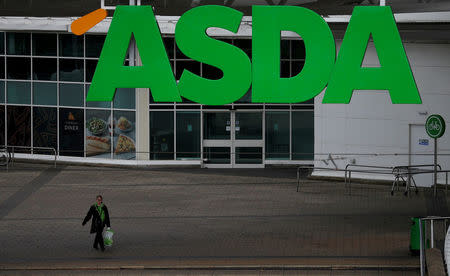Asda returns to sales growth after three years of pain
By James Davey LONDON (Reuters) - Asda, the British supermarket arm of Wal-Mart , the world's largest retailer, reported its first underlying sales growth in three years on Thursday and said its back-to-basics turnaround under a new management team was working. Of Britain's big four supermarket players -– market leader Tesco , Sainsbury’s , Asda and Morrisons -- Asda has been hurt the most by the rise of German discounters Aldi [ALDIEI.UL] and Lidl [LIDUK.UL] as its traditional price advantage was eroded. Wal-Mart has said Asda was too slow in responding to that competition and prior to Thursday's update Asda had reported eleven straight quarters of like-for-like sales decline. Wal-Mart veteran Sean Clarke, who re-joined Asda as CEO in July last year, and former Sainsbury's executive Roger Burnley, who started as chief operations officer three months later, have focused their turnaround efforts on the retail basics. They have re-established Asda's competitiveness by sharpening pricing in key areas such as fresh meat and vegetables, have improved the quality and availability of product ranges and have made its stores more attractive to shoppers. Asda said like-for-like sales rose 1.8 percent, excluding petrol, in its fiscal second quarter to June 30. That compares with a 2.8 percent fall in its first quarter. In Asda's second quarter last year sales slumped 7.5 percent, its worst ever quarterly result, meaning comparative numbers were very weak. The outcome also benefited from food price inflation across the industry. CUSTOMERS RESPONDING "Customers are responding to investments in price and store experience by visiting the stores more often and increasing their basket sizes," said Wal-Mart President and CEO Doug McMillon, who visited Asda's operations in June. "There’s still much more to be done, but we’re clearly headed in the right direction." Clarke noted 275,000 new customers shopped at Asda in the second quarter, particularly during Easter, but he cautioned that the market remained competitive. All of Britain's supermarket are also having to deal with cost pressures as the post-Brexit vote fall in the value of the pound has made imports more expensive, and with more grocery sales moving online. British retail sales slowed in July, as shoppers reduced purchases of most things other than food, adding to worries about falling consumer demand, official data showed on Thursday. After Asda's profit slumped 11.5 percent in 2016 the firm is looking to cut costs. It is in talks with stores staff over changes to working hours and possible redundancies. Last month the Sunday Times reported that Asda was considering a 4.4 billion pound ($5.7 billion) takeover of British discount retailer B&M European Value Retail . Asda has declined to comment. However, a source with knowledge of the situation said the report was not true. Separately on Thursday Wal-Mart reported a 12th straight quarterly increase in comparable sales, though margins fell, reflecting price cuts and investment in e-commerce. (Editing by Kate Holton/Jeremy Gaunt)

 Yahoo Finance
Yahoo Finance 

